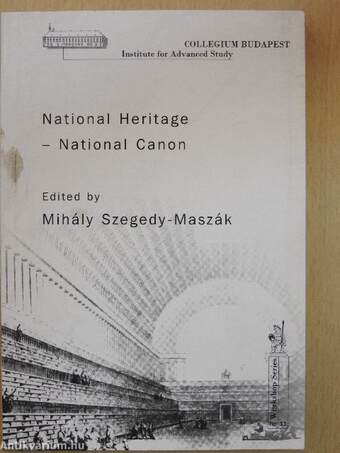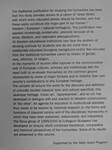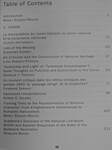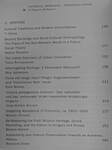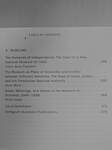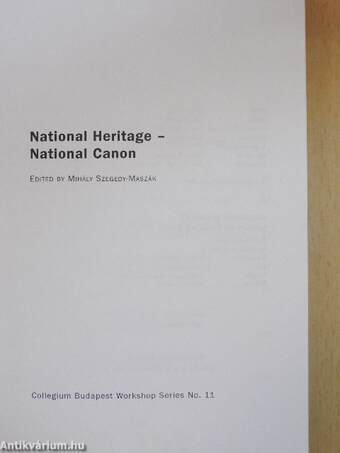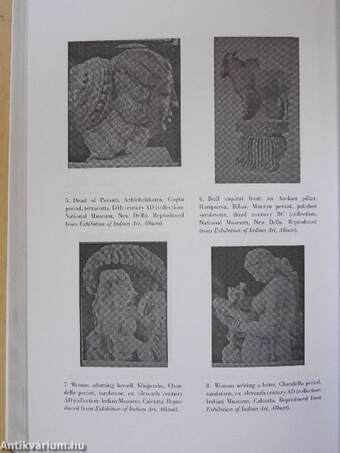1.067.335
kiadvánnyal nyújtjuk Magyarország legnagyobb antikvár könyv-kínálatát

VISSZA
A TETEJÉRE
JAVASLATOKÉszre-
vételek
National Heritage - National Canon
| Kiadó: | Collegium Budapest |
|---|---|
| Kiadás helye: | Budapest |
| Kiadás éve: | |
| Kötés típusa: | Ragasztott papírkötés |
| Oldalszám: | 381 oldal |
| Sorozatcím: | Collegium Budapest Workshop Series |
| Kötetszám: | 11 |
| Nyelv: | Angol |
| Méret: | 21 cm x 15 cm |
| ISBN: | 963-9293-03-2 |
| Megjegyzés: | További szerzők a tartalomjegyzékben. Néhány fekete-fehér reprodukcióval. Néhány francia és német nyelvű fejezettel. |
naponta értesítjük a beérkező friss
kiadványokról
naponta értesítjük a beérkező friss
kiadványokról
Fülszöveg
The traditional justification for studying the humanities has been that this study provides access to a canon of 'Great Works' with which every educated person should be familiar, and that these works constitute the major part of our humán / Western / European / national heritage(s). This justification now appears increasingly problematic, precisely because of its elitist, Western, and nationalist presuppositions. All Western educational institutions now face the problem of devising curricula for students who do not come from a traditionally-educated bourgeois background and/or feel excluded from the traditional humanities canon by reason of gender, race, ethnicity, or religion. At the moments of reunion after ruptures in the communicative web of European cultures, scholars and intellectuals feel the need both to re-situate themselves on the common ground represented by works of major thinkers and to redefine their own country's contributions to this European heritage. The concern... TovábbFülszöveg
The traditional justification for studying the humanities has been that this study provides access to a canon of 'Great Works' with which every educated person should be familiar, and that these works constitute the major part of our humán / Western / European / national heritage(s). This justification now appears increasingly problematic, precisely because of its elitist, Western, and nationalist presuppositions. All Western educational institutions now face the problem of devising curricula for students who do not come from a traditionally-educated bourgeois background and/or feel excluded from the traditional humanities canon by reason of gender, race, ethnicity, or religion. At the moments of reunion after ruptures in the communicative web of European cultures, scholars and intellectuals feel the need both to re-situate themselves on the common ground represented by works of major thinkers and to redefine their own country's contributions to this European heritage. The concern all around the world for the discovery and definition of culturally located classical texts and cultural specificity (the Javanese heritage, Indián art, 'Japaneseness', and so on) has developed in dialogue with and reaction to Western constructions of 'the other'. An agenda for education in multicultural societies thus needs to be backed by historical research on the forms and functions of classical canons and of the disciplinary frameworks in which they have been preserved, rediscovered, and interpreted. The focus group of 1999/2000 at Collegium Budapest has developed an enquiry which combined theoretical, comparative and historical perspectives of the humanities. Somé of its results are presented in this volume. Supported by the Getty Grant Program VisszaTémakörök
- Idegennyelv > Idegennyelvű könyvek > Angol > Irodalomtörténet
- Idegennyelv > Idegennyelvű könyvek > Angol > Művelődéstörténet
- Idegennyelv > Idegennyelvű könyvek > Angol > Néprajz
- Művelődéstörténet > Civilizációtörténet > Egyéb
- Művelődéstörténet > Kultúra > Története
- Művelődéstörténet > Átfogó művek, tanulmányok
- Irodalomtörténet > Magyar irodalom > Tanulmány, tanulmánykötet, esszé
- Irodalomtörténet > Irodalomelmélet > Általános
- Néprajz > Átfogó művek, tanulmányok
- Néprajz > Folklór (szellemi néprajz) > Népköltészet > Egyéb
- Néprajz > Folklór (szellemi néprajz) > Népi kultúrák > Európa
Megvásárolható példányok
Nincs megvásárolható példány
A könyv összes megrendelhető példánya elfogyott. Ha kívánja, előjegyezheti a könyvet, és amint a könyv egy újabb példánya elérhető lesz, értesítjük.



